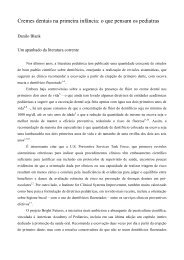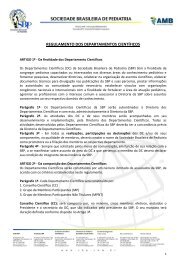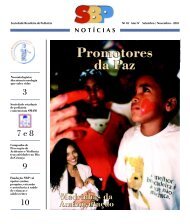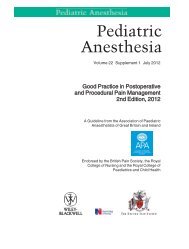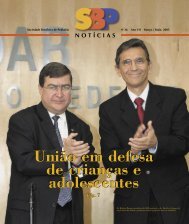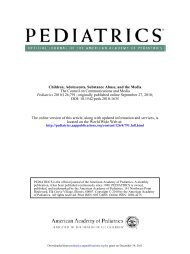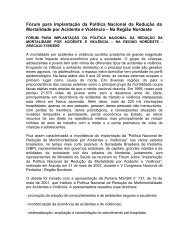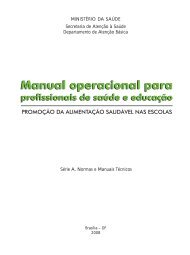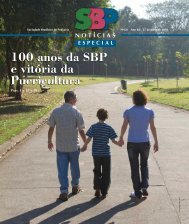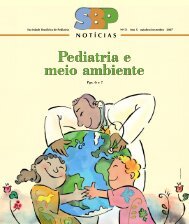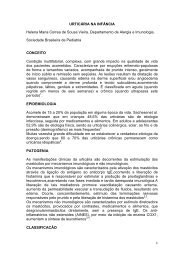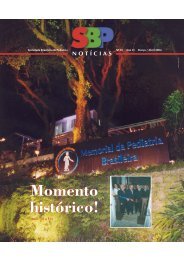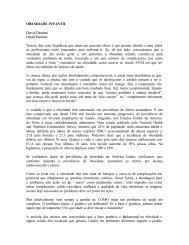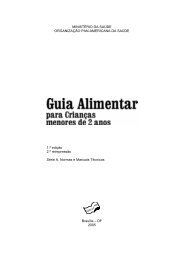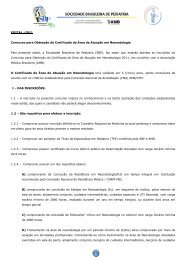The differential diagnosis of hypernatraemia in children, with ...
The differential diagnosis of hypernatraemia in children, with ...
The differential diagnosis of hypernatraemia in children, with ...
Create successful ePaper yourself
Turn your PDF publications into a flip-book with our unique Google optimized e-Paper software.
<strong>The</strong> Diagnosis <strong>of</strong> Salt Poison<strong>in</strong>g Lead<strong>in</strong>g to Hypematraemia <strong>in</strong> Children – September 2009<br />
2. Methodology<br />
This section sets out <strong>in</strong> detail the methods used to develop the evidence for the guidel<strong>in</strong>e.<br />
<strong>The</strong> methods are <strong>in</strong> accordance <strong>with</strong> the RCPCH Quality <strong>of</strong> Practice Committee standards<br />
for guidel<strong>in</strong>e development 9 .<br />
Guidel<strong>in</strong>e Development Group (GDG)<br />
A multidiscipl<strong>in</strong>ary guidel<strong>in</strong>e development group (GDG) was established. <strong>The</strong> group<br />
<strong>in</strong>cluded health pr<strong>of</strong>essionals <strong>in</strong> paediatrics, sodium handl<strong>in</strong>g and evidence-based medic<strong>in</strong>e.<br />
Support was provided from the Royal College <strong>of</strong> Paediatrics and Child Health. Details <strong>of</strong><br />
all the members are listed at the beg<strong>in</strong>n<strong>in</strong>g <strong>of</strong> the document.<br />
Development <strong>of</strong> the scope<br />
<strong>The</strong> guidel<strong>in</strong>e development group agreed a scope for the guidel<strong>in</strong>e explicitly stat<strong>in</strong>g the<br />
need for the guidel<strong>in</strong>e, the population and topic/cl<strong>in</strong>ical areas to be <strong>in</strong>cluded and not<br />
<strong>in</strong>cluded <strong>in</strong> the f<strong>in</strong>al document.<br />
Identify<strong>in</strong>g the evidence<br />
<strong>The</strong> aim <strong>of</strong> the literature review was to seek to identify all available published evidence<br />
relevant to the questions identified by the project group <strong>in</strong> relation to <strong>hypernatraemia</strong> <strong>in</strong><br />
<strong>children</strong>. Where evidence was not available, this is stated and the need for future research<br />
specified. Where evidence <strong>in</strong> <strong>children</strong> is lack<strong>in</strong>g but exists from studies <strong>in</strong> adults this was<br />
sought and <strong>in</strong>corporated <strong>in</strong>to the guidance.<br />
Literature searches were developed by an <strong>in</strong>formation specialist focus<strong>in</strong>g on the two<br />
cl<strong>in</strong>ical questions: ‘What are the possible causes <strong>of</strong> Hypernatraemia <strong>in</strong> <strong>children</strong> and<br />
their frequency <strong>in</strong> <strong>children</strong>?’ and ‘What key tests will help dist<strong>in</strong>guish excess sodium<br />
<strong>in</strong>take from water depletion?’. Search strategies were <strong>in</strong>itially developed on the Medl<strong>in</strong>e<br />
database and subsequently adapted for other databases. <strong>The</strong> search was run us<strong>in</strong>g the<br />
Ovid <strong>in</strong>terface on the follow<strong>in</strong>g databases; Medl<strong>in</strong>e (January 1966 to September 2005),<br />
PreMedl<strong>in</strong>e (March 2006), OldMedl<strong>in</strong>e (1950 to 1965), Embase (January 1980 to<br />
September 2005) and CINAHL (January 1982 to March 2006). No language restrictions<br />
were applied to the search. Modified filters were developed to exclude letters (unless they<br />
presented primary data), commentaries, editorials and newspaper articles. Additionally<br />
a filter was used on the searches to exclude animal studies. No systematic attempt was<br />
14



